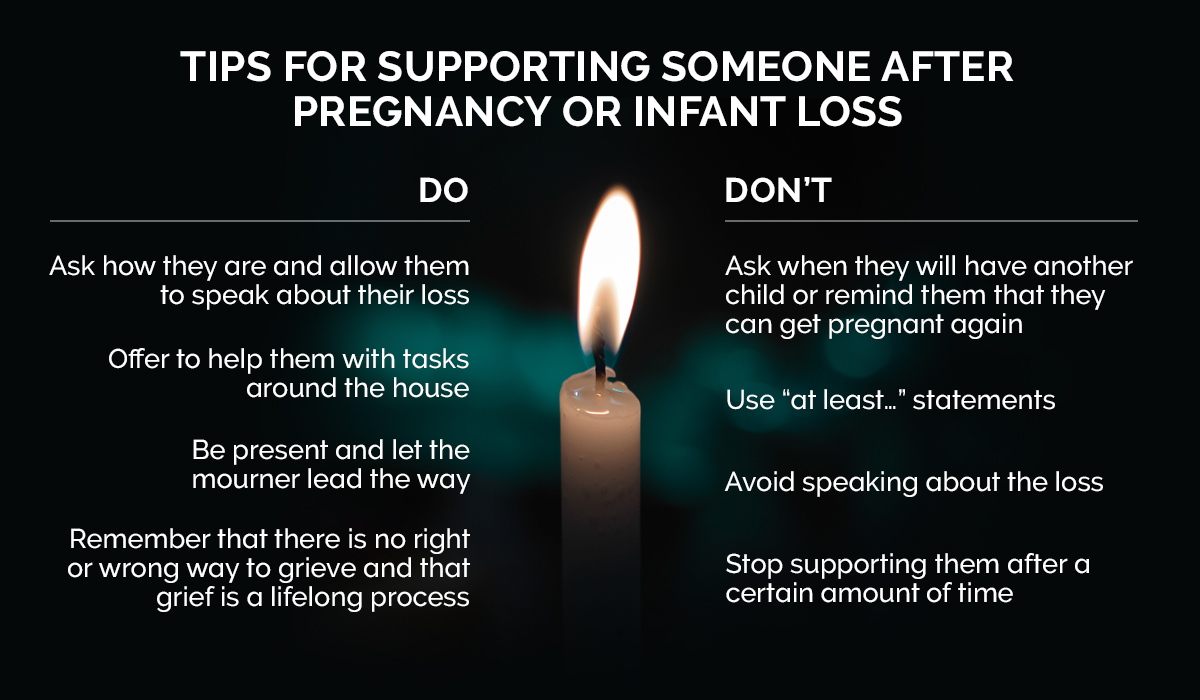Tips to Support Someone After the Loss of a Baby
A social worker offers advice on how to best support someone who is grieving a pregnancy or infant loss.

The loss of a pregnancy or the death of an infant is devastating and, sadly, happens more often than many realize. About 10% to 20% of known pregnancies end in miscarriage (pregnancy loss up to 20 weeks of gestation), according to the March of Dimes. About 21,100 babies are stillborn (loss of pregnancy after 20 weeks) and almost 20,000 babies die before their first birthday in the United States each year, according to the Centers for Disease Control and Prevention.
A lack of meaningful support from others can compound the feelings of loss. But often friends and family members aren’t sure how to care for those who are mourning, says Talia Grossman, a licensed master social worker and advanced clinician at NewYork-Presbyterian Alexandra Cohen Hospital for Women and Newborns.
“A pregnancy or infancy loss is complex and difficult to navigate,” says Grossman. “Many parents experience a sense of isolation and feel that others don’t understand. People often don’t know how to acknowledge a loss, which can lead to saying nothing out of fear of saying the ‘wrong’ thing.”
But asking those who are grieving how they are and how to support them can make a significant difference in their ability to cope, says Grossman, who leads a monthly support group for parents who have experienced a pregnancy or infant loss.
Here, Grossman shares with Health Matters advice on how to support a loved one who is experiencing this kind of grief.

Talia Grossman
Allow the space for grieving.
“It’s important to allow space to help families navigate their new world,” says Grossman. “It’s natural to want to ease the burden for our loved ones experiencing a loss. But their new situation can be overwhelming and all-encompassing. Sometimes just showing up and physically being with your loved ones can be all the comfort they need.”
Invite those in mourning to speak about their pain—and listen.
Simply asking, “How are you?” or “How are you feeling?” can help people begin to process their pain knowing that others care.
Asking the name of the child they lost is also comforting. “Often, in an effort to protect our loved ones, we choose not to talk about their baby or grief. Yet bereaved parents often say the only time they feel relief is when they do talk about their baby. It’s comforting to hear their child’s name and be able to talk about them.”
Offer practical assistance.
Many people who are grieving need help to get through the day in the immediate aftermath. People going through loss might not have the energy to make sure that they have food at home or to take a shower.
Check in to see if those experiencing loss have what they need or would benefit from your assistance. You can offer help with a task, like picking up groceries or doing laundry. You can also ask if they need you to coordinate funeral arrangements or a ceremony for the child or pregnancy they lost. And while some parents may find removing the baby items from the nursery part of their grieving process, others may find that too painful and might appreciate a close family member or friend’s involvement. Make sure the help is wanted before pitching in.
Continue to check in.
Grieving doesn’t stop after a year—or 30. “Parents often say they receive the most support immediately following the loss, but over time that support decreases,” says Grossman. “Grief after the loss of a child lasts a lifetime.”
When holidays, birthdays, or anniversaries roll around, reach out to the parents during these “grief hotspots.”
“Grief is always with you but during these important life events it can intensify,” says Grossman. “Remember the importance of continuing to show up during these hard times.”
Avoid hurtful questions and comments.
Don’t ask people when they are going to have another child or remind them that they can get pregnant again. Such questions could convey that the baby they lost isn’t worth being sad about and can be replaced. “You also don’t know what lies ahead in their fertility journey,” Grossman says.
Similarly, avoid using “at least” statements (as in, “At least you have another child”). Above all, acknowledge the loss—don’t stay silent as if nothing happened. “Saying something as simple as, ‘I was sorry to hear about your loss’ can make a griever feel seen in their loneliness,” says Grossman.
Coping With Pregnancy Loss or a Loss of an Infant
Be gentle and kind to yourself.
Grossman says you shouldn’t blame yourself. “Failure and guilt are typical feelings following a loss. It is important to remember that this type of loss rarely happens because of something anyone did or didn’t do.”
Consider “memory-making” with your baby.
Depending on your baby’s gestational age, hospitals may ask if you would like to meet or spend time with your baby. But, Grossman notes, “This may not be possible for all, and there are other ways to make memories. Some people find it helpful to write a diary or letter to their baby.” It can also be healing to hold a funeral, memorial service, or spiritual ritual for your baby.
Take the time to process the loss.
Reach out to your employer as soon as you can to let them know you will need time off. You may need your doctor to fill out paperwork to have the time off approved.
Do what feels right and take it one day at a time.
Remember that there is no set time limit for grieving. Everyone moves forward at different paces. Some parents find it helpful to set attainable goals each day to help in their grieving process, says Grossman. “This can be as simple as taking a shower or a short walk. Simply accomplishing those tasks might be all you can do on that day. Tell yourself that’s OK.”
Respect your partner’s way of grieving.
Everyone moves through grief differently. “You will feel it in different ways, so be patient with each other,” says Grossman. Talking with others beyond your partner—like a family member, friend, or professional—can offer support needed for both partners.
Share your loss with others.
Join a support group, attend a retreat for bereaved parents, or connect with a peer counselor—someone who has been in your shoes.
If you are having trouble performing daily activities, it’s wise to speak with a therapist. Call 911 or the National Suicide Prevention Hotline (988) if you are having recurrent thoughts of harming yourself or no longer wanting to live.
Additional Resources
NewYork-Presbyterian Alexandra Cohen Hospital for Women and Newborns has a virtual support group for the hospital’s patients, and other grieving parents can join. Email tak9035@nyp.org to sign up.


